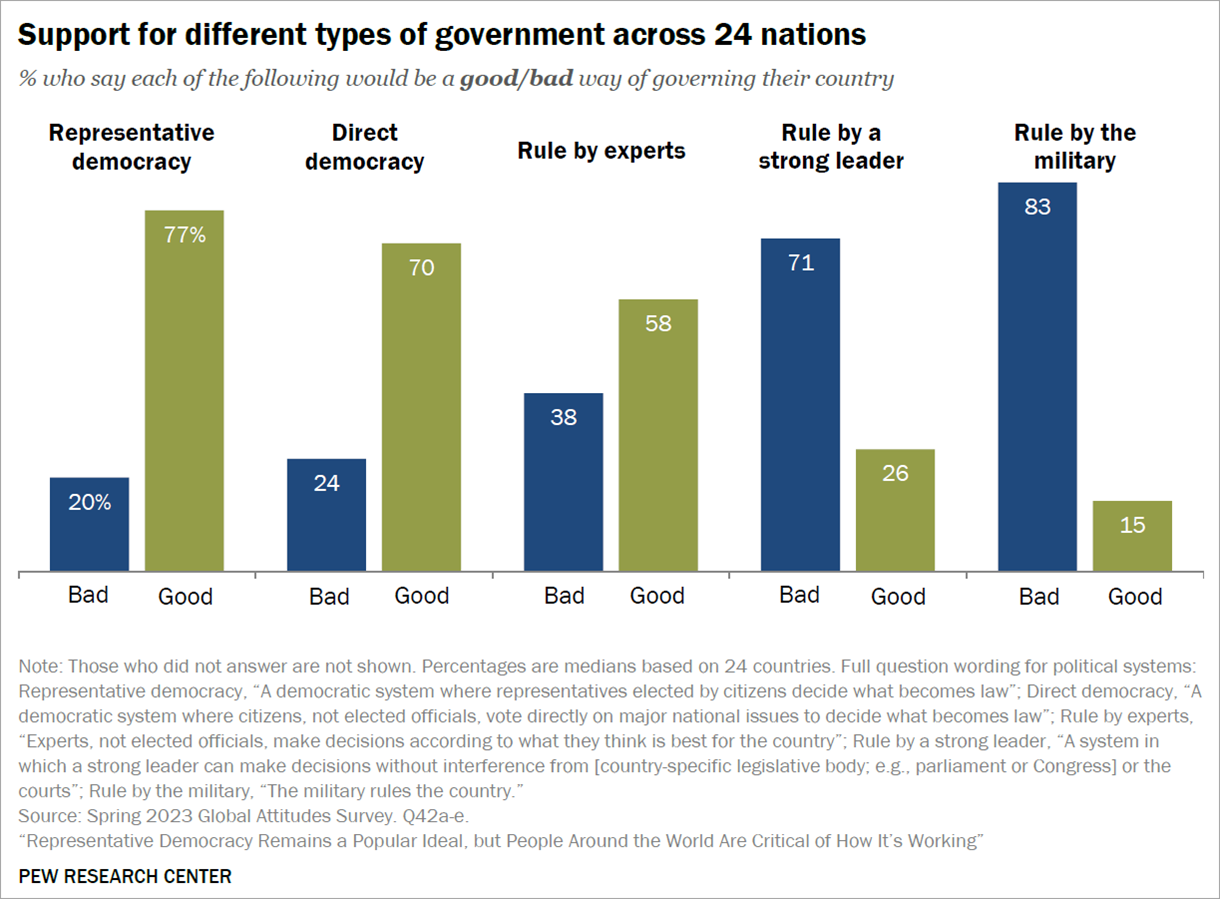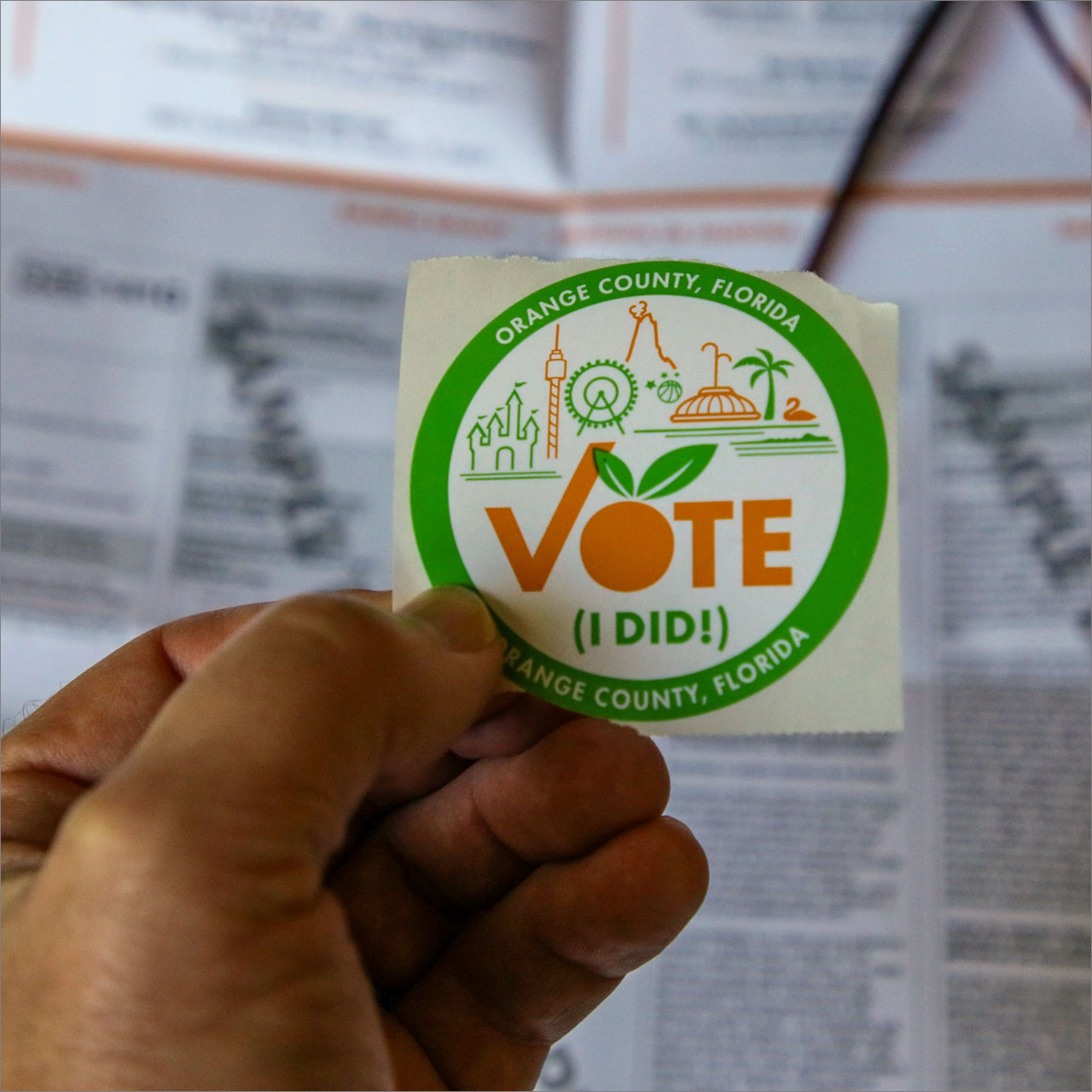
A recent report from the Pew Research Center reveals that while representative democracy remains a popular ideal globally, public satisfaction with its implementation has declined.
The study, published this week, surveyed 24 countries in 2023. It found that majorities in each country still endorse this system of democracy where representatives are elected by the public – a system in place in nearly all Western-style democracies – as a good way to govern. But enthusiasm has waned since 2017 when Pew last conducted such research.
The study’s findings highlight significant criticisms of the way democracy is working:
- A median of 59% of those surveyed are dissatisfied with how their democracy is functioning.
- 74% think elected officials don’t care what people like them think.
- 42% say no political party in their country represents their views.
The study is well worth reading (download the 106-page PDF) if you want to get a good sense of what people think about Western-style democracies and how they work.
It did prompt my thinking about how this might affect or impact voters and behaviours in any of the 80+ countries holding elections in 2024.
Elections on the Edge

Some research I did using Perplexity.ai as the search engine turned up some interesting facts and opinions from a wide variety of sources, some of which I’ve used here (all listed in the citations footnote).
What I take from this research is that the decline in faith in democracy and the upcoming elections in over 80 countries presents a complex scenario with potentially significant impacts on global political stability, governance, and public trust.
This situation is further complicated by the fact that these elections encompass a broad spectrum of political, economic, and social contexts, ranging from established democracies to countries with authoritarian regimes or those undergoing political transitions.
Some potential impacts:
1. Erosion of Trust in Democratic Institutions
The Pew Research report indicates a global dissatisfaction with how democracy is functioning, with a median of 59% of respondents across 24 countries expressing dissatisfaction 2. This disillusionment can lead to an erosion of trust in democratic institutions, potentially undermining their legitimacy and effectiveness. When citizens lose faith in the electoral process and democratic governance, it can result in decreased voter turnout, increased political apathy, and a susceptibility to populist and authoritarian appeals 2 3.
2. Increased Political Polarization
The decline in faith in democracy is often accompanied by increased political polarization, as seen in the dissatisfaction among different demographic groups, particularly among the youth 3. This polarization can manifest in more contentious and divisive political discourse, making it challenging to form stable governments and achieve consensus on critical policy issues. In countries like Belgium, where coalition negotiations are notoriously lengthy, such polarization could exacerbate governance challenges 1.
3. Rise of Populist and Authoritarian Leaders
Dissatisfaction with democracy has been linked to the rise of populist and authoritarian leaders who promise to address the perceived failures of the democratic status quo 2 3. These leaders often capitalize on public discontent by presenting themselves as alternatives to the traditional political elite. While some young people express greater satisfaction with democracy under populist regimes, this trend raises concerns about the long-term health of democratic institutions and the potential for undermining checks and balances, human rights, and the rule of law 3.
4. Impact on Policy and Governance
The decline in faith in democracy and the resulting political dynamics can significantly impact policy and governance. Governments may adopt short-term, populist policies to appease dissatisfied voters rather than pursuing long-term, sustainable solutions to complex issues like economic inequality, climate change, and social justice 3. Additionally, in countries facing significant economic and social challenges, such as Venezuela, the lack of faith in democracy could exacerbate existing crises and hinder effective governance 1.
5. Global Implications
Given the interconnectedness of the global political landscape, the decline in faith in democracy in numerous countries could have broader implications for international relations, trade, and security 4. For instance, elections in geopolitically significant countries like the United States, India, and Mexico not only have domestic implications but also affect global geopolitics, economic stability, and international collaborations on issues like climate change and security 4.
In Conclusion…
The decline in faith in democracy across many countries, coinciding with a significant number of elections in 2024, presents a critical juncture for the global community. It underscores the need for democratic reforms that address public grievances, enhance the inclusivity and effectiveness of democratic institutions, and rebuild trust in the democratic process.
What can you do that would demonstrate your support of and belief in democracy? Where you can, vote – a good way to offer a pathway towards renewing democratic faith and strengthening democratic governance in your part of the world.
Related reading:
- FIR #381: The State of Trust in 2024 – 29 January 2024 (firpodcastnetwork.com)
- AI-generated disinformation: A new battleground for elections in 2024 – 8 September 2023 (nevillehobson.com)
- Tony Blair’s Vision for Election Success – 30 July 2023
Citations:
- (1) Elections tracker 2024: every vote and why it matters
- (2) Many Across the Globe Are Dissatisfied With How Democracy Is Working
- (3) Faith in democracy: millennials are the most disillusioned generation ‘in living memory’
- (4) 2024 is a record year for #elections – here’s what you need to know
- (5) Key findings about Americans’ declining trust in government and each other
- (6) Loss of public trust in Government is the biggest threat to democracy in England – Carnegie UK Trust
- (7) Elections everywhere all at once
- (8) Representative Democracy Remains a Popular Ideal, but People Around the World Are Critical of How It’s Working
- (9) Distrusting democrats: A panel study into the effects of structurally low …
- (10) The Cloudflare Blog
- (11) How Americans View Trust, Facts, and Democracy Today
- (12) The Global Erosion of Trust and Democracy and Its Implications for Health and Societies
- (13) The year of elections – Is 2024 democracy’s biggest test ever?
- (14) Report: Growing Numbers Are Dissatisfied With Democracy
- (15) Lack of trust in politics threatens democracy: New report and poll – Carnegie UK Trust
- (16) List of elections in 2024 – Wikipedia
- (17) Public Trust in Government: 1958-2023
- (18) how declining trust in the prime minister affects trust in British democracy | Blog | University of Essex
- (19) 2024: Year of elections | World news | The Guardian
- (20) 1. Attitudes toward different types of government systems
- (21) Democracy in Crisis
- (22) Insights from Data: What the Numbers Tell Us About Elections and Future of Democracy — Integrity Institute
- (23) Social Media Seen as Mostly Good for Democracy Across Many Nations, But U.S. is a Major Outlier
- (24) Global dissatisfaction with democracy at a record high











